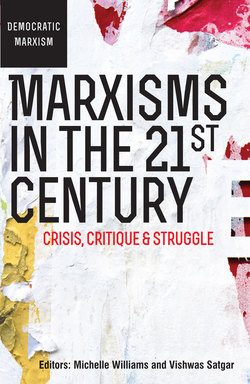Читать книгу Marxisms in the 21st Century - John Saul - Страница 20
На сайте Литреса книга снята с продажи.
Third Wave: Sociological Marxism
ОглавлениеSecond-wave Marxism was concerned with building socialism on earth via a state-regulated economy that ranged from social democracy to the Soviet model of planning, forms of African socialism and the Yugoslav self-managed economy. When markets were not rejected they were seen as an adjunct to the socialist project. Thus, Johanna Bockman (2011) has argued that the early thrust of neoclassical economics was to enjoin markets to a socialist project, whether this was the use of markets to help solve pricing problems of state planning or the organisation of self-management economies. The harnessing of neoclassical economics to capitalism is a more recent phenomenon distinctive to third-wave marketisation, posing once again the question of the meaning of socialism.
If classical Marxism postulated the self-destruction of the capitalist mode of production, projecting an unexamined utopian communism to follow, and if Soviet Marxism acted as a state ideology to represent an actually existing state socialism, the third wave of Marxism focuses not on the economy or the state but on civil society. Here we build on the second-wave Marxism of Gramsci who was the first to centre the importance of civil society as an institutional space distinct from, though connected to, state and economy. Just as Lenin’s writings straddled first-and second-wave Marxism, so we can say the same is true of Gramsci and hence his enduring importance. Many of Gramsci’s formulations, being in opposition to Soviet Marxism, prefigure the society-centred third-wave Marxism. Gramsci’s concern with the relation of state and civil society is, however, too limiting; we need to add Polanyi’s concern with the relation of market and society.7
In contrast to Gramsci, Polanyi and Fanon, third-wave Marxism thinks of civil society in global as well as national terms – a civil society that defends humanity against mounting ecological disasters that in the final analysis assume a global scale. The commodification of nature, whether this takes the form of privatisation of water, of land or of air, generates crises that affect the entire planet. To be sure, in the short run some will be better equipped to survive disasters of earthquakes, hurricanes and floods than others but in the end we will all suffer – the prototype is disasters such as Chernobyl or the impending catastrophe of climate change. These will call for global solutions based on human rights that protect the foundations of human existence, which in turn require shutting down the capitalist mode of production that systematically destroys the environment in pursuit of profit.
In the third wave of marketisation the commodification of nature may represent the new threat to humanity, but it coexists with a recommodification of labour, as we see everywhere in the development of informalisation, flexploitation and precarity, and with new forms of commodifying money, as we saw in the financial crisis of the 1990s culminating in the financial crisis of 2008. Bailing out finance capital has not altered the tendency to commodification of money but further consolidated it.
The collapse of state socialism in East and central Europe in 1989 and of the Soviet Union in 1991 was, in part, the result of third-wave marketisation, but it also strengthened third-wave marketisation, giving it new energy and discrediting any alternative to market supremacy. As seen from within the Soviet orbit, the illusory potentialities of a market economy were inflated by the fragility and contradictions of state socialism. Always seeking to catch up with capitalism, its incapacity to sustain a dynamic economy led to its down-fall. However, during its existence the Soviet order did generate alternative visions of a democratic socialism constituted from below – the cooperatives of Hungary, the Solidarity movement in Poland and burgeoning civil society in Soviet perestroika. This socialism from below rested on the idea of the collective self-organisation of society.
Socialism of third-wave marketisation will not emerge through some catastrophic break with the past as was the case with classical Marxism nor through state-sponsored socialism from above, but through the molecular transformation of civil society, the building of what Erik Wright (2010) calls real utopias – small-scale visions of alternatives such as cooperatives, participatory budgeting and universal income grants that challenge on the one hand, market tyranny and on the other, state regulation. The role of such a sociological Marxism is to elaborate the concrete utopias found in embryonic forms throughout the world. The analysis focuses on their conditions of existence, their internal contradictions and thus their potential dissemination. Sociological Marxism, therefore, keeps alive the idea of an alternative to capitalism, an alternative that does not abolish markets or states but subjugates them to the collective self-organisation of society.
Table 2.1: Three waves of Marxism
The methodology employed by each wave of Marxism involves different relations between theory and practice. For classical Marxism theory dictated to practice: theory determined the inevitable collapse of capitalism and rise of socialism, so practice was only affected by knowing where one was in the historical trajectory. For Soviet Marxism practice – national survival at all costs – dictated to theory. Marxism was a thinly disguised ideology of the ruling party state. Sociological Marxism abandons theoretical certainties and practical imperatives and seeks instead to achieve a balance or dialogue of theory and practice. The point is not only to change the world now that we have understood it, but also to change it in order to understand it better. We search out real utopias that can galvanise the collective imagination but also interrogate them for their potential generalisability (see Burawoy and Wright 2002).
If classical Marxism offered a universality based on flawed laws of history, and Soviet Marxism offered a universality based on a singular dictatorial regime, sociological Marxism offers us no guarantees, only an eternal search and reconstruction, a universality that is always contingent, created from the concrete with the help of the abstract (see Hall 1986).
